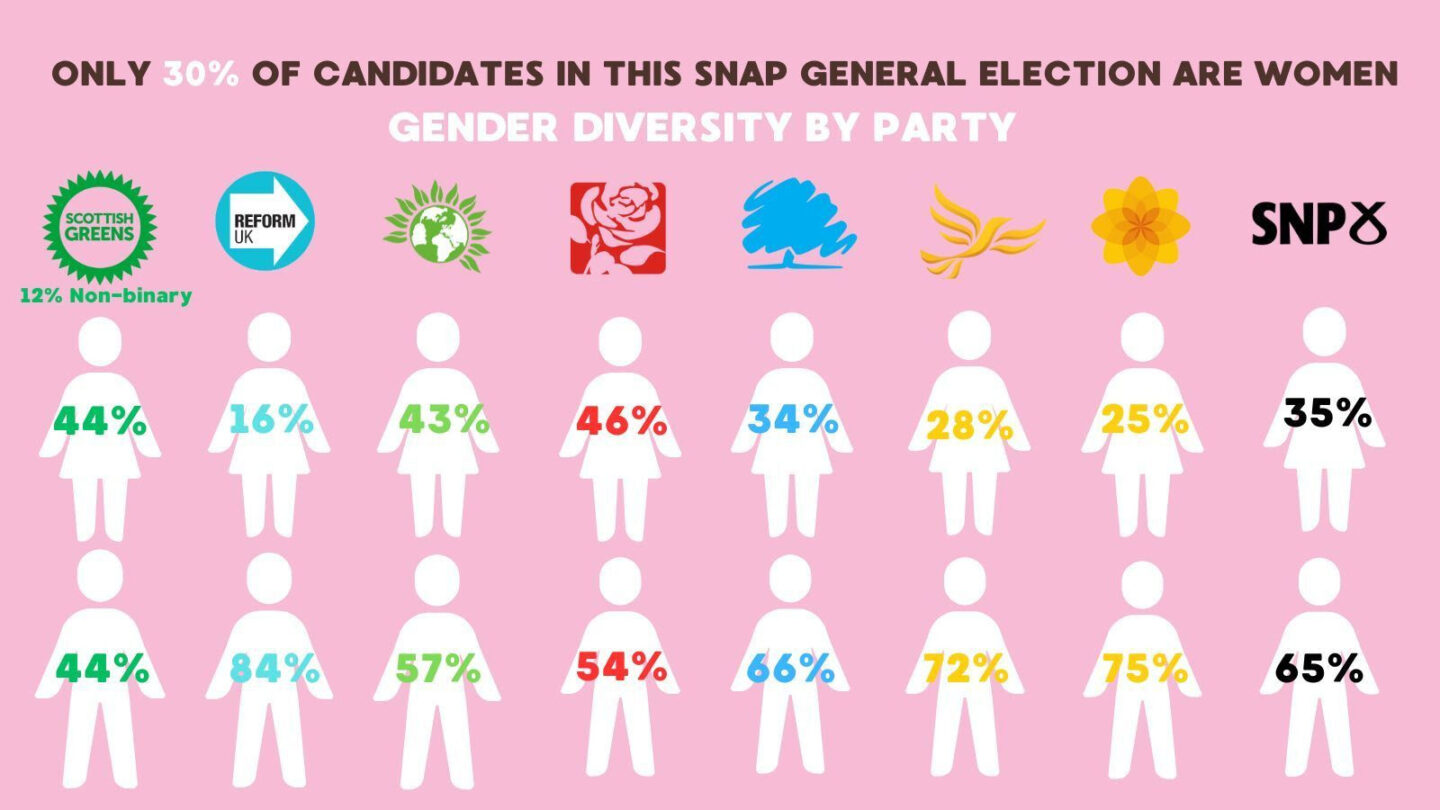You all know me as a feminist but in my day job I’ve also been a Policy Analyst for the past 14 years. This puts me in a very good position to carry out a gender policy analysis of the manifestos for the 2024 election. So today I’m bringing you a political post about what the main parties are offering for women in particular in the 2024 election on July 4th.
I’m going to set my stall out now and say that I will be voting Labour. I have a very left leaning progressive Labour MP who is a gay woman and very aligned to my personal politics so it’s an easy choice for me this year.
I also hope that the Tories are voted out. I think they’ve caused so much harm to this country with their cruel and inept reign since 2010. However, this blog post is going to be as fact-based as possible. I won’t say unbiased as I think that anyone remaining truly unbiased is unlikely – post-modernist thinking and all that!
Women under 30 are the group least likely to vote (and therefore could make a big difference in this election). Women are also more likely to be floating voters and to vote late so I’m hoping that if you hit these categories this blog post could encourage you to vote.
Representation matters – numbers of female candidates
Firstly representation matters and I would like to see more female MPs elected this year.
Of course you can have female politicians who do very little for women and men who are great feminist allies but generally speaking, women have lived experience of women’s issues and when we have more female politicians we are statistically more likely to get policies funded that affect us in positive ways.
The 2024 UK general election will see a record number of candidates. 4,515 candidates have been nominated to stand on 4 July, beating the previous record of 4,150 set in 2010.
296 of Labour’s 632 candidates are women at 47% (down from 53% of candidates at the last General Election under Jeremy Corbyn).
Labour’s Women’s Network has worked projections that predict that any iteration of a Labour government would mean more Labour women to the House of Commons than at any other moment in history and quite possibly, as a result, the highest number of women parliamentarians ever.
This helpful graphic from Elect Her shows gender diversity of candidates for the July 2024 UK general election by political party. Labour have the most women running and unsurprisingly Reform have the fewest at 16%. Notably the Green Party has 44% women and 12% non binary candidates.


The manifestos – how do they impact women?
The Top 5 political parties by candidates in 2024 are:
| Conservative and Unionist Party | 635 |
| Labour Party (including 48 Lab/Co-operative) | 631 |
| Liberal Democrats | 630 |
| Reform UK | 609 |
| Green Party (England and Wales) | 574 |
Here is what is in these party manifestos that particularly impact women. If a political party is missing from a section, that is because their manifesto doesn’t cover the issue. Watch out for the negative impacts here too – not everything is a positive impact (cough cough Reform).
Employment and the Gender Pay Gap
Liberal democrats:
- Making Statutory Sick Pay available to the more than one million workers earning less than £123 a week (most of whom are women).
- Extending the use of ‘name-blind’ recruitment processes in the public sector and encouraging their use in the private sector.
- Improving diversity in public appointments by setting ambitious targets and requiring progress reports to Parliament with explanations when targets are not met.
Greens:
- A move to a four-day working week. With ultimate plans to introduce a universal basic income.
- £15 per hour minimum wage.
Labour:
- Banning zero hours contracts; ending fire and rehire; and introducing basic rights from day one to parental leave, sick pay, and protection from unfair dismissal.
- Make sure the minimum wage is a genuine living wage.
- Will enact the socio-economic duty in the Equality Act 2010
- Labour will take action to reduce the gender pay gap, building on the legacy of Barbara Castle’s Equal Pay Act.
- Establish a Fair Pay Agreement in adult social care.
Reform:
- Lift the Income Tax start point to £20,000 per year.
- All job seekers and those fit to work must find employment within 4 months or accept a job after 2 offers. Otherwise, benefits are withdrawn. This may negatively impact women with children in particular.
Pension Pay Gap and the WASPI women
Liberal democrats:
- Developing measures to end the gender pension gap in private pensions and ensure working-age carers can save properly for retirement.
Conservatives and Unionist:
- Considering the Ombudsman report into WASPI women and will work with Parliament to provide a response.
Male violence against women and girls
A lot of the parties are doing stuff about male violence against women and girls but I will say a lot of it is about the treatment of women after it has happened rather than preventing it in the first place.
Liberal democrats:
- Embedding domestic abuse specialists in every police force and 999 operator assistance centre to ensure that reports from survivors are handled effectively and sensitively.
- Addressing the delays in domestic abuse referrals from the police to the CPS and subsequent decision making by the CPS, acknowledging the unique risk these delays can pose to women’s safety.
- Establishing a Women’s Justice Board and providing specialist training for all staff in contact with women in the criminal justice system.
- Make misogyny a hate crime and give police and prosecutors the resources and training they need to prevent and prosecute all hate crimes while supporting survivors.
- Fully implementing the Istanbul Convention on preventing and combating violence against women and domestic violence, with protections for all survivors regardless of nationality or immigration status.
- Expanding the number of refuges and rape crisis centres to meet demand.
- Ensuring sustainable funding for services to support survivors of domestic abuse, with a particular focus on community-based and specialist ‘by and for’ services.
- Ensuring that survivors are properly supported within the criminal justice system.
- Require social media companies to publish reports setting out the action they have taken to address online abuse against women and girls, and other groups who share a protected characteristic.
Conservative and Unionists:
- Look at how the Child Maintenance Service can better support victims of domestic or economic abuse.
- Legislate to create new offences for spiking, the creation of sexualised deepfake images and taking intimate images without consent.
- Toughen sentencing for murders that take place within the context of domestic abuse with new aggravating factors, such as if they involve coercive and controlling behaviour or gratuitous attacks.
- Introduce a 25-year prison term for domestic murders, regardless of whether a weapon is used. Those who kill their domestic abusers will not face the same starting point. This will be accompanied by a review of homicide sentencing, looking to close loopholes that allow some killers to get off lightly.
- Introduce an aggravating factor for murders that happen in the context of ‘rough sex’, so it is never used as an excuse to get a lighter sentence.
- A new investigatory model for rape for police forces and prosecutors and pre-recorded cross examination for victims in all Crown courts.
- Consider the recommendations of Baroness Bertin’s Independent Review of Pornography and ensure we have the right safeguards in place to protect against any harmful impacts of the industry
- Will make life imprisonment without parole mandatory for more of the most heinous murderers and require rapists and other serious sexual offenders to spend the whole of their sentences behind bars.
- Ensure sex offenders cannot evade justice or conceal their identity by restricting sex offenders from changing their names.
Greens:
- Campaign to end violence against women and girls (but gives no specifics).
- Scrap the Police, Crime Sentencing and Courts Act, the Public Order Act and other legislation that erodes the right to protest and free expression.
- Repair and renew our crumbling court system with a £2.5bn investment.
Labour:
- Landmark mission to halve violence against women and girls in a decade.
- Use every government tool available to target perpetrators and address the root causes of abuse and violence.
- Specialist rape and sexual offences teams in every police force. The most prolific and harmful perpetrators will be relentlessly targeted, using tactics normally reserved for terrorists and organised crime.
- Fast-track rape cases, with specialist courts at every Crown Court location in England and Wales.
- Introduce domestic abuse experts in 999 control rooms so that victims can talk directly to a specialist and ensure there is a legal advocate in every police force area to advise victims from the moment of report to trial.
- Ensure schools address misogyny and teach young people about healthy relationships and consent.
- Ensure police forces have the powers they need to track and tackle the problem.
- Strengthen the use of Stalking Protection Orders and give women the right to know the identity of online stalkers.
- Introduce a new criminal offence for spiking to help police better respond to this crime.
- Strengthen the rights and protections available to women in co-habiting couples, as well as for whistleblowers in the workplace, including on sexual harassment.
- Reform the justice system to put the needs of victims first.
- Introduce mandatory professional standards for the police on vetting, checks and misconduct for individual officers; and stronger training on violence against women and girls. Anyone with a history of violence against women and girls will be barred from the service and they will introduce automatic suspensions if officers are investigated for domestic abuse and sexual offences.
- Introduce new legal safeguards around strip-searching children and young people.
- Review sentencing (particularly around crimes against women and girls) to ensure it is brought up to date.
- Labour recognises an increase in extreme misogynistic content online driving a culture of violence against women so Labour will build on the Online Safety Act.
Reform
- Scrap all Diversity, Equality and Inclusion roles and regulations in the police. This would have a negative impact on women.
- Change the Definition of Hate Crime. Reform claim that the CPS and police definition of a hate crime has led to systemic bias. ‘Members of the British public must not be investigated because ‘any’ person ‘perceives’ that a hate crime has been committed.’ This would negatively impact women of colour, LGBTQ+ and disabled women in particular.
- Make child grooming an aggravating offence. Improve safeguarding of victims and vulnerable. No bail for grooming gang offenders.
Pregnancy/maternity/paternity
Liberal Democrats:
- Give fathers and partners an extra ‘use it or lose it’ 4 weeks paternity leave at 90% of salary.
- Double statutory maternity pay and shared parental leave to £350 a week.
- Make all parental leave a day 1 right. Extend those rights to the self employed.
- Reduce mortality rates for Black women using maternity services.
- Require large employers to publish their parental leave and pay policies.
- Introduce a ‘Toddler Top-Up’: an enhanced rate of Child Benefit for one-year-olds.
- Scrap the bedroom tax.
- Transform perinatal mental health support for those who are pregnant, new mothers and those who have experienced miscarriage or stillbirth.
Conservatives and Unionist Party:
- Bring forward a national strategy for maternity care as recommended by the APPG on Birth Trauma’s inquiry.
- Deliver additional funding for maternal safety and improve access to mental health services for new mums, improve perinatal pelvic health services to prevent and support women with birth injuries and postnatal appointments dedicated to checking mums, not just their babies.
- Expand women’s health hubs so that every integrated care system has at least one hub up and running.
- Roll out fracture liaison services to every region, reaching 100% coverage by 2030 as osteoporosis disproportionately impacts women.
- Support continued research into disparities in maternity care through the National Institute for Health and Care Research.
- Will amend the NHS Constitution so that it recognises every patient’s right to request single-sex accommodation and same-sex intimate care.
- We will not allow the word ‘woman’ to be erased by health services. Words such as ‘breastfeeding’ and ‘mother’ will not be replaced by ‘chestfeeding’ and ‘birthing parent’. (Their manifesto shrouds changes to trans rights under the ‘dog whistle’ of protections for women and girls. I have no doubt that this manifesto and the Reform manifesto are dangerous for trans people).
Greens:
- Increase Universal Credit and legacy benefits by £40 a week.
- Abolish the two-child benefit cap, lifting 250,000 children out of poverty.
- End the ‘bedroom tax’.
Labour:
- Strengthen rights to equal pay and protections from maternity and menopause discrimination and sexual harassment.
- Labour will ensure that trusts failing on maternity care are robustly supported into rapid improvement.
- Labour will train thousands more midwives as part of the NHS Workforce Plan and set an explicit target to close the Black and Asian maternal mortality gap.
- Labour will digitise the Red Book record of children’s health, improving support for new families. Will enable vaccinations for babies and children as part of health visits.
Reform
- Front-load the Child Benefit system for children aged 1-4 to give parents the choice to spend more time with their children in their early years.
Childcare/schools
Liberal Democrats:
- Establish a new national body for SEND to fund support for children with high needs.
- Give disadvantaged children aged 3-4 year old an extra 5 hours a week of childcare and triple the funding they receive.
- Reviewing the rates paid to providers for free hours to ensure they cover the actual costs of delivering high-quality childcare and early years education.
The Conservative and Unionist Party:
- Give working parents 30 hours of free childcare a week from when their child is nine months old to when they start school from September 2025.
- Moving to a household system for Child Benefit payments, so families don’t start losing Child Benefit until their combined income reaches £120,000
- Investing £300 million so that all parents can access wraparound childcare before and after school by September 2026.
- Deliver a Family Hub in every local authority in England.
- ‘Guarantee the contested concept of gender identity is not taught to children’. (I’m including this as a negative, just to be clear on my position on that).
- Lift the cap on faith schools and preserve the rights of independent schools.
- Introduce 1 year of compulsory national service for all 18 year olds.
Greens:
- £1.4bn per year to be invested by local authorities in Sure Start Centres.
- In negotiation with the sector, to extend the outgoing government’s offer of childcare to 35 hours per week from nine months.
- Fully restore the role of the school nurse, ensuring that all schools have access to an on-site medical professional.
- £5bn to be invested in special needs (SEND) provision within mainstream schools
Labour:
- Free breakfast clubs in every primary school.
- Limit the number of branded items of uniform and PE kit that schools can require
- Open an additional 3,000 nurseries through upgrading space in primary schools, to deliver the extension of government funded hours.
- Review the parental leave system, so it best supports working families, within their first year in government.
- Recruit an additional 6,500 new expert teachers. Labour will reinstate the School Support Staff Negotiating Body, which will help address the acute recruitment and retention crisis in support roles.
- Provide access to specialist mental health professionals in every school.
- Plan for Young Futures Hubs, which will make sure every community has an open-access hub for children and young people with drop-in mental health support.
Reform:
- Would abolish the NHS Race and Health Observatory which works to identify and tackle ethnic inequalities in health and care (could have a particular negative impact on women and women of colour).
- Reform the Child Maintenance Service: Reform will launch a special division of the Family Court for maintenance and defaults. Share parental care 50/50 where appropriate. Rights of access for grandparents.
Inequality in town planning and transport
Often when it comes to planning for local infrastructure investment and priority goes to roads. However, the majority of pedestrians are women. Often doing the school run with strollers etc.
Greens:
- Investment of £2.5bn a year in new cycleways and footpaths.
- Reimagining how we use streets in residential areas to reduce traffic and open them up for community use.
- Adopting Active Travel England’s objective of 50% of trips in England’s towns and cities to be walked, wheeled or cycled by 2030.
Birth control and freedom to choose
I can’t believe I have to include this now but we need to be wary given what’s happening in Gilead, whoops I mean America…
Liberal democrats:
- Protect everyone’s right to make independent decisions over their reproductive health without interference by the state and ensure access to high-quality reproductive healthcare, including enforcing safe access zones around abortion clinics and hospitals.
Menstruation and menopause
Liberal democrats:
- Ending period poverty by introducing a right for anyone who needs them to access free period products.
Female unpaid labour
One of the issues that restricts women in many facets of their life is inequality when it comes to unpaid labour. The economy thrives on it but it stifles women’s progression.
Liberal Democrats:
- Increasing Carer’s Allowance and expanding eligibility for it.
- Introducing a statutory guarantee of regular respite breaks for unpaid carers.
- Introducing paid carer’s leave, building on the entitlement to unpaid leave.
- Making caring a protected characteristic under the Equality Act 2010 and requiring employers to make reasonable adjustments to enable employees with caring responsibilities to provide that care.
- Introducing a statutory definition of kinship care.
- Building on the existing pilot to develop a weekly allowance for all kinship carers.
Women abroad
Liberal democrats:
- Recognising the role of education as a force for good, and committing to spend 15% of ODA on education in the world’s most vulnerable areas, especially focusing on girls and young women.
Other
Liberal democrats:
- Ending the gender price gap so that women are not charged more than men for practically identical products or services marketed at them.
The Conservatives and Unionist Party:
- Work with the British Business Bank and private sector fund managers to secure a £250 million Invest In Women Fund to support female entrepreneurs.
- Reform the Child Maintenance Service to prevent noncompliance and new laws to help crack down on non-payment.
- Will introduce controls on all ‘Equality, Diversity and Inclusion’ initiatives and spending. This may negatively affect women.
- Will prioritise equal access for women and girls in investment in grassroots sports facilities.
Reform
- Marriage tax allowance of no tax on the first £25,000 of income for either spouse.
- Leave the European Convention of Human Rights and reform the Human Rights Act which would put women more at risk.
- Replace the 2010 Equality Act, in particular not allowing positive action. This is likely to harm women.
- There is also significant extension of privatisation of the NHS in the Reform manifesto.
Financial viability
| Party | Costings provided? |
| Conservatives | Yes but these have been criticised by the Institute for Fiscal Studies (IFS) |
| Labour | Yes but criticised by the IFS |
| Green | Yes but criticised by the IFS |
| Lib Dems | Yes but criticised by the IFS |
| Reform | Yes but heavily criticised by the IFS said ‘the sums in this manifesto do not add up’. |
Conclusion
So my conclusion here is that Labour and the Lib Dems provide the best offer for women, followed by the Conservatives and Greens with Reform last and least with more policies that would harm women than help them.
In casting your vote I would urge you to remember that the Tories have been in power since 2010, so their track record in delivery should be kept in mind. A majority of the burden of previous Tory cuts fell on the shoulders of women.
I will also say that given how much the Tory party have been caught out lying and how much they have failed to deliver on their previous promises I personally don’t believe a word they say in this manifesto. They’ve had since 2010, if they wanted to be doing something they’d already be doing it. When someone shows you who they are, believe them. Deeds not words.
I have not had the time to also pull out other intersectional equality issues like race/disability/sexual identity etc which are obviously also extremely important so I would urge you to read the manifestos themselves which is why I have linked them in the post. They are highly illuminating and you will quickly figure out which you are most aligned too.
Vote with your heart and vote with hope not fear and for the love of the Goddess, just bloody vote!
If you liked this post you might also like:
- 20 actions men can take to be better allies to women
- Inspiring feminist blog posts to help smash the patriarchy
- Help my kid is sexist! Top 6 tips for raising feminist kids…
- For those who don’t think the gender pay gap is really a problem…
If you have enjoyed this post or found it useful, here are some quick and easy ways that you can support Nomipalony or say thanks:
- Share this post with your friends
- Follow Nomipalony on Facebook, X, Instagram, Pinterest, YouTube or Tik Tok
- Pop over to my Amazon Storefront to see what products I have been buying and loving from there recently, including my health and fitness products list.
- Click here to buy me a virtual cuppa
- Sign up to my mailing list
- Women can join my feminist Facebook group – the Nomipalony Freehouse


Thanks for this Nyomi it’s a brilliant review of the manifesto of each of the main parties. Let’s hope July 4th sees a lot of tories crying in sports centres! Stopthetories.vote
Thank you Matt and agreed!!
Brilliant post.
Thank you. Really helped my overwhelmed little brain help to make a decision that means my vote won’t be wasted.
Thanks so much Cassie – I’m so happy it helped!